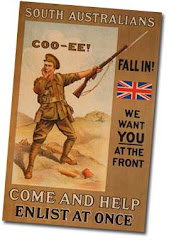
Horace Billing was born in Mount Gambier, SA on New Year's Eve 1891 to Clara Eleanor Billing. He attended school in Mount Gambier, finishing his high school days in 1910. He worked as a student teacher at several schools over the next few years, including Mount Templeton, Hummock's Hill (Whyalla) and Thebarton. In December 1915 he received his senior certificate from the Public Examinations Board and it is believed he was teaching at Coromandel Valley Public School when he enlisted in March 1916.
Horace attended non-commissioned officer training in Adelaide in May and June 1916 and was allocated to the 6th reinforcements to the 50th Battalion in October 1916. He sailed for the UK in late October 1916 as an acting sergeant (probably due to his age and status as a teacher), but reverted to the ranks upon arrival in England a few days before his 25th birthday. His leadership skills must have been obvious as he was promoted to provisional corporal after a few days and attended more non-commissioned officer training before he was sent to France where he joined the 50th Battalion on 13 May 1917. Less than two weeks later Horace was promoted to lance corporal, and he served during the Battle of Messines from 7-12 June 1917. In July he was promoted to corporal, and in September the battalion was again heavily engaged during the Battle of Zonnebeke on 26 September 1917. A few weeks later he was sent for officer training, and after further training rejoined his unit on 17 April 1918 as a second lieutenant, and was allocated command 10 Platoon, 'Cork' Company.
Early on the morning of 24 April 1918, the German spring offensive hit the frontline east of Villers-Bretonneux. 10 Platoon were roused from their billets in the village of Daours at 5am to participate in a counter-attack to recapture the town, but didn't move off until after 11am. As they marched to link up with the 49th Battalion, 'Cork' Company was hit by a number of German 'whizz bang' shells, one of which struck very close to Horace causing a serious head wound. He was promoted to lieutenant on 14 May whilst he was recuperating, and rejoined the 50th Battalion on 12 June 1918 whilst they were back in the frontline near Daours. On 8 July the Battalion was involved in the Battle of Hamel, then between 8-10 August they attacked along the Bray-Corbie Road as part of the Battle of Amiens. Horace went on leave in the UK in September, followed by a further training stint at the gas school before the war ended.
After the war ended Horace was initially detached as a finance officer at the Australian Corps School before being granted six months leave to attend language courses at the Sorbonne in Paris and at Rome University. Before he embarked to return to Australia he also visited schools in Scotland. He finally returned to South Australia in February 1920 and his appointment as an officer was terminated in April 1920. At first he lived in Malvern with his mother, but was moved around to various locations as a school teacher then school inspector. During the Second World War Horace served as a lieutenant in the 4th Garrison Battalion between June 1940 and February 1944. He was living in Lamaroo when he volunteered. In the 1950's the Billings lived in both Goodwood Park and Mount Pleasant, and they were living at Glengowrie when his wife Irene died in 1969. Horace marched with his former battalion comrades on ANZAC Day, often catching up over a drink at the Crown and Sceptre hotel afterwards. Horace passed away on 6 December 1976 at the age of 84 and was cremated at Centennial Park. His name is inscribed on the Coromandel Valley Public School roll of honour and the Unley Town Hall Honour Board.
Photograph: Courtesy of State Records of South Australia







No comments:
Post a Comment